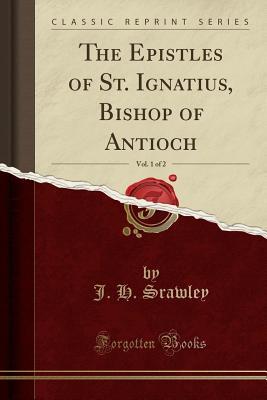- Bíblia
- Leia a Bíblia
- Versões da Bíblia
- Verso do dia
- Planos de Leitura
- Versos por Tópico
- Books of the Bible
- Imagens bíblicas
- Estude
- Comentários
- Concordâncias
- Dicionários
- Enciclopédias
- Sermões
- Bible Atlas & Maps
- BP Wiki
- Devocionais
- Devocionais de hoje
- Light of the World
- Todos os devocionais
- Inspirational Quotes
- Mais
- Picture Quotes
- Videos
- Inspirador
- Estudo da Bíblia
- O que a Bíblia diz
- Bible Q&As
- Daily Bread
- Bible by Genre
- Bible Stories
- Random Bible Verse
- Comunidade
- Store
The Epistles of St. Ignatius, Bishop of Antioch, Vol. 1 of 2 (Classic Reprint)
by Ignatius of Antioch
Excerpt from The Epistles of St. Ignatius, Bishop of Antioch, Vol. 1 of 2
The present translation of the epistles of St. Ignatius is intended to set before English readers, in an accessible form, the writings of one of the most important characters in the Church history of the period succeeding the age of the Apostles. In these epistles we have the key to the right understanding of the character of the Church at the beginning of the second century. The two facts to which they bear witness are, on the one hand, the significance of the Incarnation for Christians of that generation as the central truth of Christianity, and, on the other, the importance attached to the visible unity of the Church as expressed in the organization of the Christian societies under bishops, presbyters and deacons. The striking personality of the writer of the epistles, and the controversy which has gathered round them, combine to make them one of the most interesting products of early Christian times.
Bishop Lightfoot's great work (Ignatius and Polycarp, 1885) has exhaustively treated of most of the critical questions which are connected with the text and the exposition of the epistles.
About the Publisher
Forgotten Books publishes hundreds of thousands of rare and classic books. Find more at www.forgottenbooks.comwww.forgottenbooks.com
This book is a reproduction of an important historical work. Forgotten Books uses state-of-the-art technology to digitally reconstruct the work, preserving the original format whilst repairing imperfections present in the aged copy. In rare cases, an imperfection in the original, such as a blemish or missing page, may be replicated in our edition. We do, however, repair the vast majority of imperfections successfully; any imperfections that remain are intentionally left to preserve the state of such historical works.
The present translation of the epistles of St. Ignatius is intended to set before English readers, in an accessible form, the writings of one of the most important characters in the Church history of the period succeeding the age of the Apostles. In these epistles we have the key to the right understanding of the character of the Church at the beginning of the second century. The two facts to which they bear witness are, on the one hand, the significance of the Incarnation for Christians of that generation as the central truth of Christianity, and, on the other, the importance attached to the visible unity of the Church as expressed in the organization of the Christian societies under bishops, presbyters and deacons. The striking personality of the writer of the epistles, and the controversy which has gathered round them, combine to make them one of the most interesting products of early Christian times.
Bishop Lightfoot's great work (Ignatius and Polycarp, 1885) has exhaustively treated of most of the critical questions which are connected with the text and the exposition of the epistles.
About the Publisher
Forgotten Books publishes hundreds of thousands of rare and classic books. Find more at www.forgottenbooks.comwww.forgottenbooks.com
This book is a reproduction of an important historical work. Forgotten Books uses state-of-the-art technology to digitally reconstruct the work, preserving the original format whilst repairing imperfections present in the aged copy. In rare cases, an imperfection in the original, such as a blemish or missing page, may be replicated in our edition. We do, however, repair the vast majority of imperfections successfully; any imperfections that remain are intentionally left to preserve the state of such historical works.
BUY NOW
Paperback, 94 pages
Published April 21st 2018 by Forgotten Books (first published September 27th 2015)
Se inscrever
© 2025 Bibleportal.com Todos os direitos reservados.

St. Ignatius of Antioch (35 -117)
(Ancient Greek: Ἰγνάτιος Ἀντιοχείας, Ignátios Antiokheías; ad c. 35 or 50 – 98 to 117), also known as Ignatius Theophorus (Ιγνάτιος ὁ Θεοφόρος, Ignátios ho Theophóros, lit. "the God-bearing"), was a student of John the Apostle, was the third bishop of Antioch, and is now counted among the Apostolic Fathers of the Christian Church.[En route to Rome, where according to Christian tradition he met his martyrdom by being fed to wild beasts, he wrote a series of letters which have been preserved as an example of very early Christian theology. Important topics addressed in these letters include ecclesiology, the sacraments, and the role of bishops. Ignatius modeled his writings after Paul, Peter, and John, and even quoted or paraphrased their own works freely, such as when he quoted 1 Cor 1:18, in his letter to the Ephesians.
... Show more